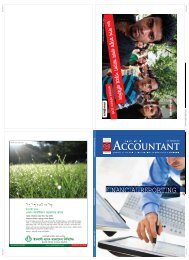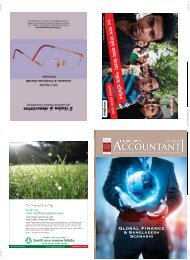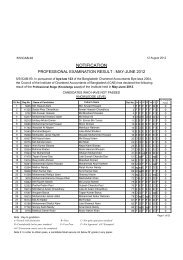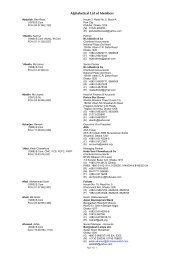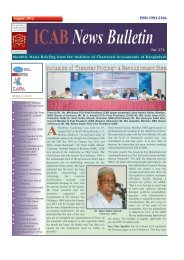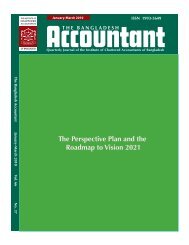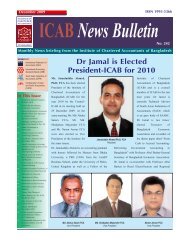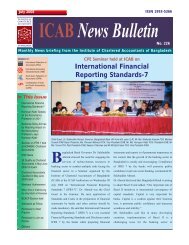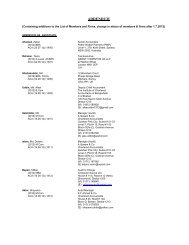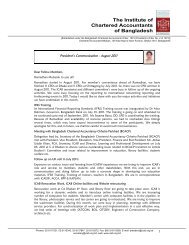Forma # 1.ai - ICAB
Forma # 1.ai - ICAB
Forma # 1.ai - ICAB
Create successful ePaper yourself
Turn your PDF publications into a flip-book with our unique Google optimized e-Paper software.
Opportunities and Challenges for<br />
Adoption of IFRS for SMEs in Bangladesh<br />
Md. Shahadat Hossain FCA<br />
On July 2009 the International<br />
Accounting Standards Board<br />
(IASB) published an International<br />
Financial Reporting Standard<br />
(IFRS) designed for use by small<br />
and medium sized entities<br />
(SME).That standard is the<br />
International Financial Reporting<br />
Standard for Small and<br />
Medium–sized Entities (IFRS for<br />
SMEs or the standard). Small and<br />
medium-sized entities are entities<br />
that do not have public<br />
accountability, and publish<br />
general purpose financial<br />
statements for external users.<br />
According to IASB’s report SMEs<br />
are estimated to represent more<br />
than 95% of all companies in the<br />
world. The objective of financial<br />
statements of a small or<br />
medium-sized entity is to provide<br />
information about the financial<br />
position, performance and cash<br />
flows of the entity that is useful<br />
for economic decision-making by<br />
a broad range of users who are<br />
not in a position to demand<br />
reports tailored to meet their<br />
particular information needs.<br />
The objective of introducing IFRS<br />
for SMEs is to ensure that financial<br />
statements provided to external<br />
users i.e banks are consistently<br />
prepared by all businesses. That<br />
does make sense when a bank or<br />
other external user is trying to<br />
evaluate the financial viability of<br />
the company. In Bangladesh IFRS<br />
for SMEs is very important<br />
because almost more than 70<br />
percent of total bank loan is<br />
disbursed to the private<br />
companies. Again more than 30<br />
percent of stock market<br />
encompasses the share of banking<br />
sector. So to ensure the depositors<br />
interest and also to ensure the<br />
interest of investors in banking<br />
sector financial discipline of small<br />
and medium sized entities need<br />
to be strengthened. For<br />
strengthening the financial<br />
discipline for SMEs there is no<br />
other alternative but to prepare<br />
financial statements according to<br />
the standard. Now the question is<br />
according to local legislation how<br />
far the standard is adoptable in<br />
Bangladesh. In Bangladesh<br />
financial statements of private<br />
limited companies i.e the entity<br />
that does not have public<br />
accountability are prepared<br />
complying with the contents of<br />
Companies Act. So it is relevant to<br />
compare the contents of the<br />
standard and that of the<br />
Companies Act. Some important<br />
issues in this regard are described<br />
below.<br />
As per the standard a<br />
complete set of financial<br />
statements of an entity shall<br />
include<br />
(a) a statement of financial<br />
position as at the reporting<br />
date.<br />
(b) a separate income statement<br />
and a separate statement of<br />
comprehensive income.<br />
(c) a statement of changes in<br />
equity for the reporting period.<br />
(d) a statement of cash flows for<br />
the reporting period.<br />
(e) notes, comprising a summary<br />
of significant accounting<br />
policies and other explanatory<br />
information.<br />
The Bangladesh Accountant January - March 2011 65



